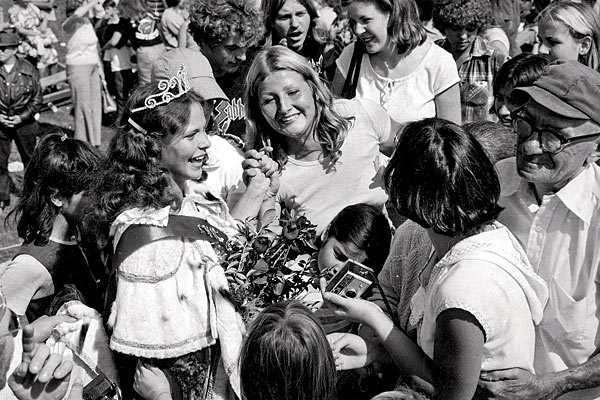
A scene from Tom Palazzolo’s 1979 Labor Day: East Chicago
By 1965, when the St. Louis native Tom Palazzolo graduated from the School of the Art Institute of Chicago, several of his hometown’s landmarks had been demolished. A shame, he thought. So Palazzolo, who had begun making experimental films as a student, pledged to focus on singular places and people with stories to tell in Chicago, his new home.
For subjects, he turned to the likes of the East Chicago Lions Club and to Mary Ellen St. Aubin, a Southwest Side barkeep whose husband, Parnell, had played a munchkin in The Wizard of Oz. They star in Palazzolo’s short films Labor Day: East Chicago (1979) and I Married a Munchkin (1994), both featured in Tom Palazzolo’s Chicago. Available in April from Facets Multimedia, the DVD is the latest in Facets’ Reel Chicago series of newly restored and reissued documentaries, which aims to bring to light a lost era of local filmmaking. Palazzolo’s naturalistic and gritty approach, akin to and inspired by street photography (see “Charles Cushman and ‘The Day in Its Color’”), is a prime example of the unsung school that flowered from the 1960s through the 1980s and lives on in the local production house Kartemquin Films (Hoop Dreams, The Interrupters).
“It’s about going out in the street and getting the content,” says Reel Chicago’s producer, Susan Doll. “That’s the Chicago way, and it gives these films an immediacy.”
Other titles include Jill Godmilow’s The Popovich Brothers of South Chicago (1977), Raul Zaritsky and Linda Williams’s Maxwell Street Blues (1981), and William Friedkin’s The People vs. Paul Crump (1965), one of the first efforts from the Oscar-winning director. Last up, due out this summer, is a collection of four educational films by Gordon Weisenborn (a protégé of John Grierson, the pioneering filmmaker who coined the term “documentary”).
The restoration work has been funded through grants from the Donnelley Foundation, the Illinois Arts Council, and the MacArthur Foundation. But some flaws proved too costly to fix, such as a hair caught in a four-minute stretch of Labor Day: East Chicago. No matter: Doll calls the imperfection “a teachable moment for a new generation about the nature of shooting in 16-millimeter.”
Beyond their historical and educational significance, the films serve as a bid to elicit some overdue recognition for Chicago documentarians. “[They used] the camera as a chronicler and as a force for social change,” Doll says. “I have yet to find a [film] textbook or history that mentions Chicago. What they contributed has gotten lost or forgotten.” That is, until now.
GO The Popovich Brothers of South Chicago screens March 3 at Southside Hub of Production; for info, southsidehub.org.
Photograph: (Labor Day: East Chicago) Courtesy of Facets Multimedia


